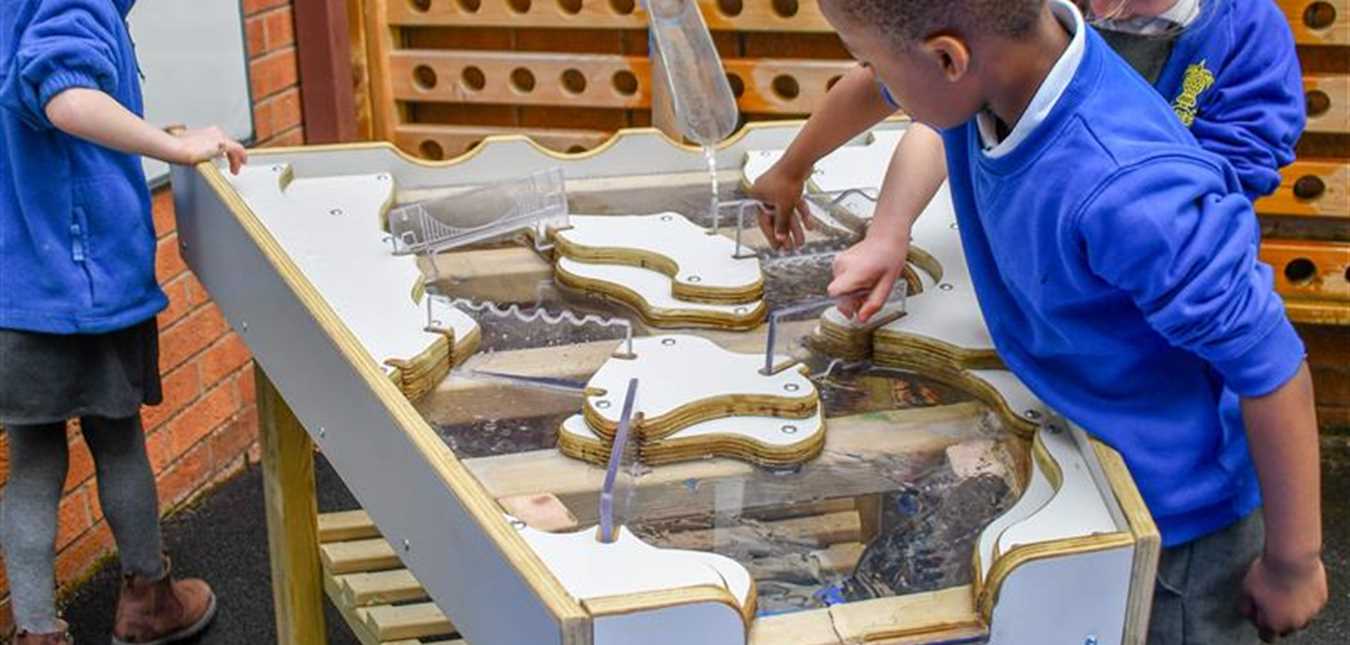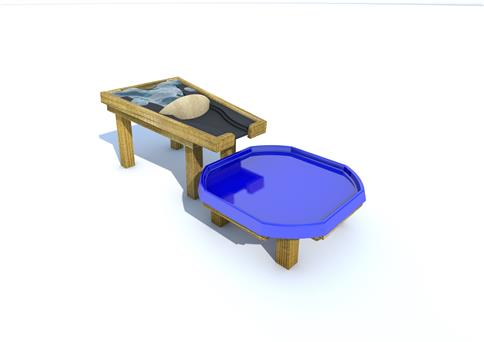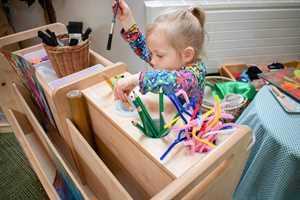Children's Health
The Importance of Water Play
Discover how important water play is for your kids and how to incorporate it into your everyday lesson plans to create an interactive, engaging, and effective learning environment for your pupils.
What is Water Play?
Water play is any play activity that involves water and tools like buckets, toys and watering cans etc. that encourage children to engage with the water and explore their senses through stimulation.
The concept of water play has a positive impact on children’s learning and has been recognised by various educators, researchers and parents over the years.
One notable early advocate for the educational value of play was Friedrich Froebel, the founder of the kindergarten movement in the 19th century. He believed that play was essential for children’s learning and development.
In more recent times, researchers have continued to explore the benefits of water play and water toys for young ages. Carol M. Gross, for example, has written about the science concepts that toddlers and young children learn through this activity, identifying it as a key medium for enhancing learning through discovery (Carol M. Gross).
Her work highlights how water play toys and resources can build the foundation for understanding a multitude of scientific concepts, including physics, chemistry, biology, and maths.
While it may be challenging to pinpoint the very first individual to note the positive impact of water play products on children’s learning, it is clear that the idea has been supported and expanded upon by many in the field of early childhood education.
The benefits of this activity for childhood development are now well-established and recognised as an important part of early learning curriculums.
Benefits of Water Play
Water play can provide a multitude of benefits which include improving fine motor skills and gross motor skills, personal and social development, cognitive development, hand eye coordination improvement, enhanced social skills and more!
Water Play in an EYFS (Early Years Foundation Stage) classroom environment refers to activities that involve the use of water to support learning and development in young children. It forms a sensory play that is not only enjoyable but also educational.
Here are some key benefits of water play in an EYFS setting explained in further detail:
- Sensory Exploration and Cognitive Development: Water play is a form of sensory play; making it inherently sensory-rich, providing tactile experiences that stimulate cognitive growth. As kids scoop, pour, and splash, they engage in exploratory learning, which enhances their understanding of scientific concepts like volume, buoyancy, and cause and effect.
- Physical Development: The manipulation of water aids in refining both gross motor skills and fine motor skills. Lifting, pouring, splashing and stirring strengthen muscles and coordination, laying the groundwork for future physical tasks, including writing.
- Emotional and Therapeutic Benefits: The soothing properties of water offer a therapeutic effect. The sound and feel of water can calm many children, providing a peaceful respite from the bustling activity of an EYFS setting.
- Social Skills and Communication: Water play activities encourages social interaction. Children learn to share resources, negotiate roles, and collaborate, which are essential skills for social development. The shared experiences also fosters language development as children articulate their play.
- Creativity and Imagination: An open-ended resource, water invites imaginative play. Children create scenarios, role-play, and experiment, which fuels creativity and problem-solving abilities.
- Mathematical and Scientific Learning: Water play introduces basic mathematical concepts such as measuring and comparison. Children learn to quantify and use mathematical language naturally as they engage with water.
- Concentration and Persistence: Engaging with water can enhance concentration. The focus required to complete tasks like filling containers or constructing waterways promotes attention to detail and persistence.
- Personal and Social Development: As children of young ages make decisions and explore independently, they develop a sense of autonomy. Successfully navigating water play tasks boosts self-confidence and a sense of achievement, preparing them for the real world.
- Understanding the Environment: Interacting with water helps all ages appreciate its values and the need for conservation. They learn about the environment and the importance of preserving natural resources. If you place the activity outside, the children can breathe in fresh air and play in the sun, adding more benefits!
- Accessibility and Inclusivity: Water play is universally accessible, catering to varying abilities and backgrounds of all ages. It provides a level playing field where all kids can participate and learn.
Water play in EYFS settings is a vital educational tool. It nurtures a wide range of developmental areas, from physical to social to cognitive, making it an indispensable element of early childhood education.
By embracing the benefits of this activity, educators can create rich, engaging learning experiences that ripple through a child’s development, laying a strong foundation for lifelong learning.
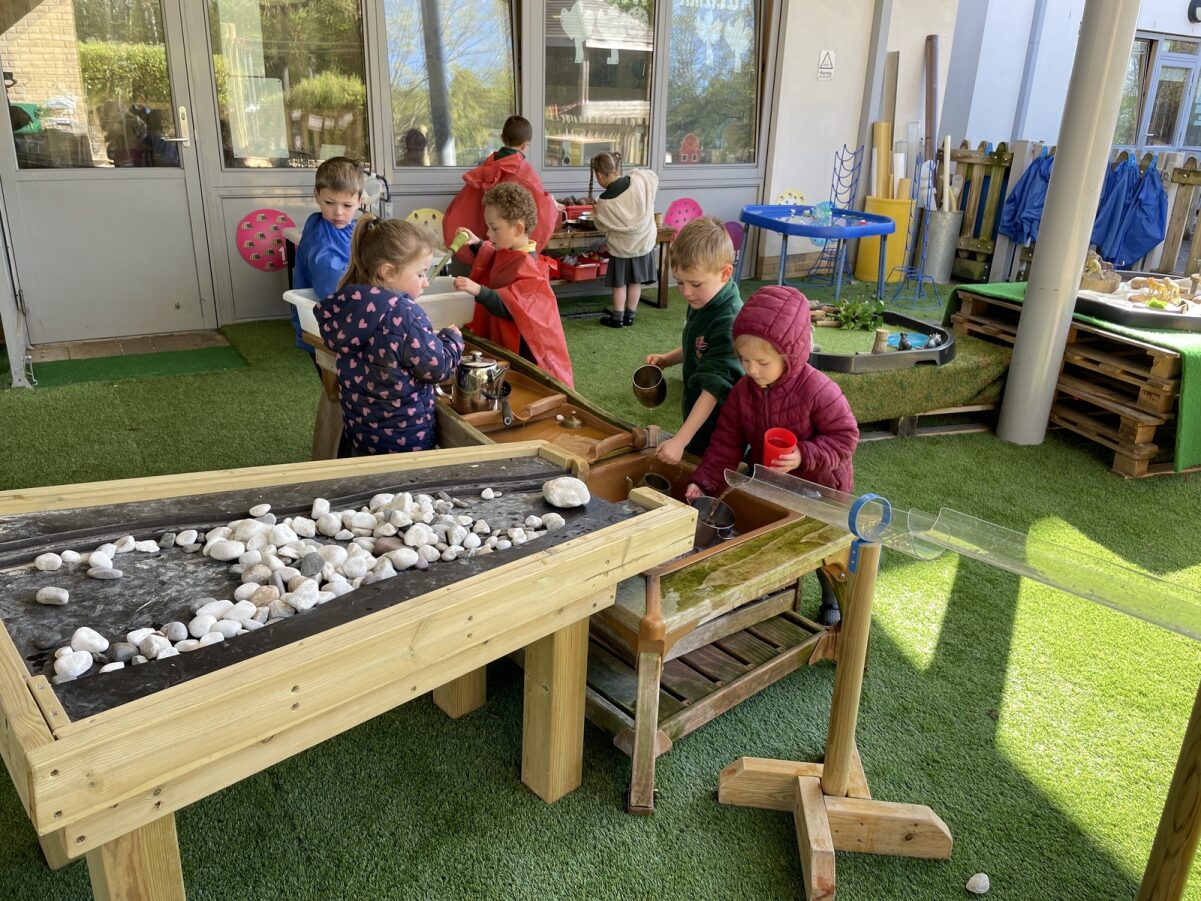
The above benefits encapsulate the essence of this activity in an EYFS setting, illustrating its extensive benefits across various developmental domains. The integration of this type of activity into the curriculum is beneficial and essential for the comprehensive growth of young learners.
Pentagon Play's Damming Station
Pentagon Play recognises the importance of the science concepts behind water play within the curriculum and has produced a wonderful range of water play products and resources. The newest addition our “Damming Station” has now launched!
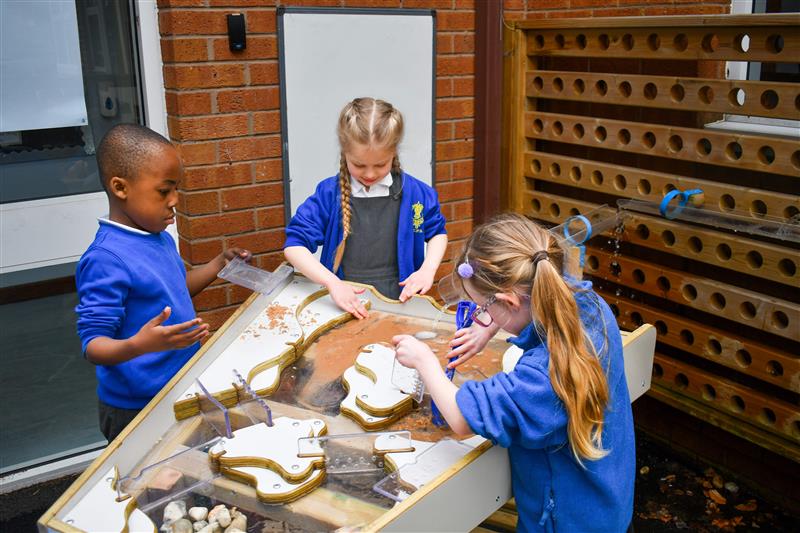
This water play table is made from high-pressure treated “play grade” timber with a PETG clear base, where up to 4 children at a time can have fun learning and playing at this fantastic resource.
Based on the River Avon, it allows children to learn and play about rivers as well as encourages them to manipulate and investigate water and other natural materials.
It also includes a dam that has been based on the shape of the Clifton suspension bridge, which crosses the river Avon in Bristol! A wonderful water play table to help EYFS geography and science lessons!
Product Spotlight
The Damming Station comes with 10 clear reversible dams for children to slot between islands and experiment with water flow, different materials, and the dams to problem-solve ways to stop the flow of water.
The clear bottom also helps the children see the flow of water down the station encouraging children’s PSED, critical thinking, and communication skills.
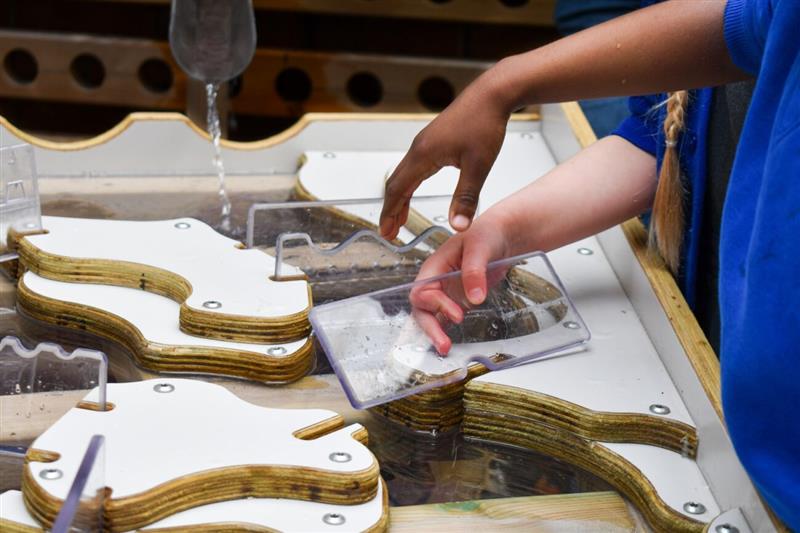
The Damming Station can be used in isolation or in conjunction with Pentagon Play’s Water Walls, Tuff Spot Tables, and Water Tables to create a fun, engaging, and positive learning environment.
Numerous water play toys, ideas and lesson plans can incorporate Pentagon Play’s Damming Station, allowing you to teach multiple different subjects (maths, geography, DT etc.) in a fun and engaging way.
Below is a fun activity for any Early Years setting. Have fun exploring and learning about water with your EYFS children!
Activity:
Creating a practical geography lesson for EYFS focusing on water flow and dams can be both educational and fun. Here’s a lesson plan idea that incorporates hands-on activities and Pentagon Play’s Damming Station to help young learners understand these concepts:
Lesson Title: Exploring Rivers and Dams
During this lesson, you children will start to get a better understanding of a variety of different topics, whilst working on cognitive and gross motor skills.
Objectives:
- Understand the basics of water flow in rivers.
- Learn how dams control water flow.
- Explore the impact of water flow on the environment.
Materials:
- Pentagon Play’s Damming Station.
- Sand, pebbles, and rocks.
- Small water toys (like trees and animals).
- Watering buckets, cans or jugs.
- Blue food colouring.
Introduction (10 minutes):
- Begin with a group discussion about water. Ask the little ones where they find water, what we use it for, and why it’s important.
- Discuss with the children what a river and dam are.
- Show pictures of rivers and dams (show the River Avon and tell the children that the Damming Station is based on it) and explain how dams are used to control water flow.
- Discuss with the children how dams can create habitats for certain animals and change the environment for others.
Main Activity (30 minutes):
- Place sand and pebbles in the Damming Station.
- Fill the Damming Station with water and add a few drops of blue food colouring if desired.
- Encourage the children to create their own riverbed in the sand using their hands or tools.
- Introduce water toys (like animals) and plants to create a more realistic scenario.
- Once the scene is set ask the children to introduce the clear dams into the Damming Station.
- Ask the children to observe what happens when they introduce a dam into the river.
- Ask the children to pour more water into the Damming Station from the top end. Ask questions: Did the water stop flowing? How did it affect the areas around the dam? What do you think happens in real life when a dam is built? Discuss, how the water stops flowing and how this can create a lake.
- Talk about the importance of dams for preventing floods and generating electricity.
Experiment (20 minutes):
- Replace a solid dam piece with a dam piece with a small opening in it from Damming Station, watch what happens, and discuss it with the children.
- Discuss why it’s important for dams to be strong and what could happen if they break.
Conclusion (10 minutes):
- Recap what was learned during the lesson.
- Ask the children to explain in their own words how a dam works.
Extension Activities:
- Create a chart or drawing of the water cycles and discuss how rivers and dams fit into it.
- Visit a local river or dam if possible.
- Have a water conservation discussion, talking about ways to save water at home and school.
Remember to always supervise the children closely during water play activities to ensure safety. Enjoy your water exploration lesson!
For more information on Pentagon Play’s Damming Station and Packages or Water Play Resources contact the Pentagon Play team or email our team where one of our expert advisers will be happy to help!



